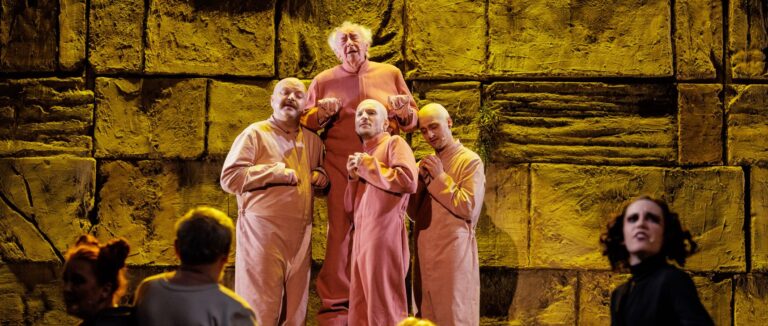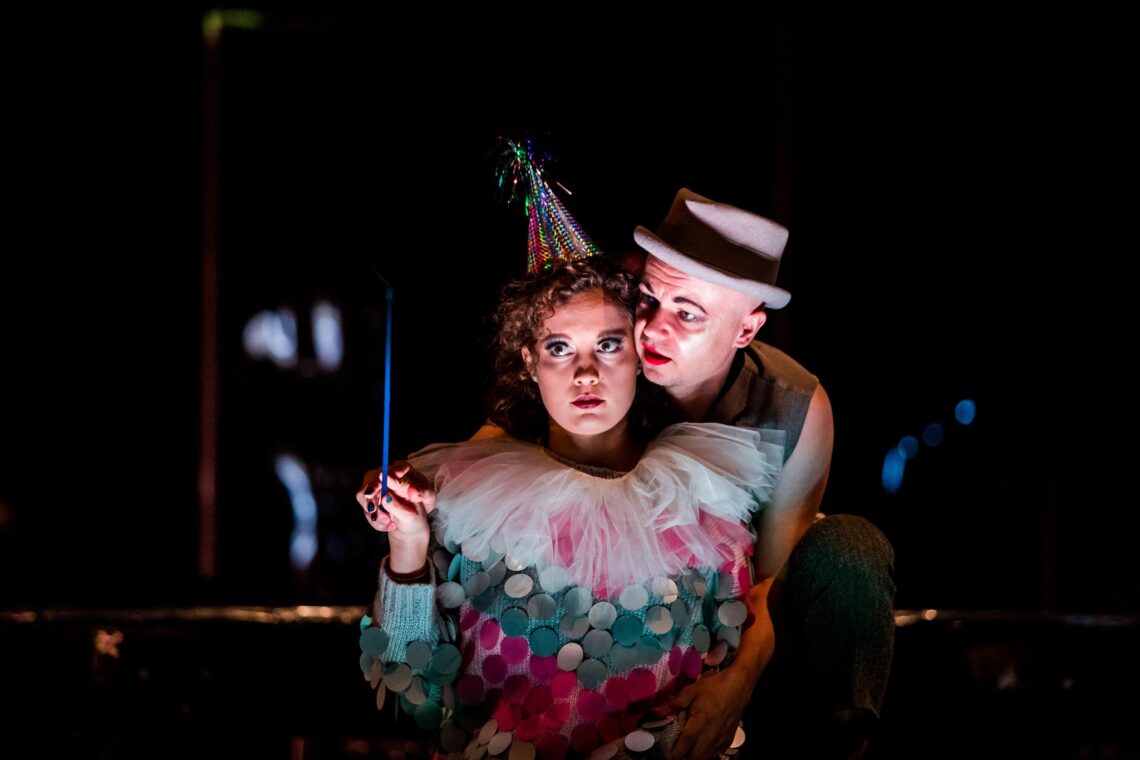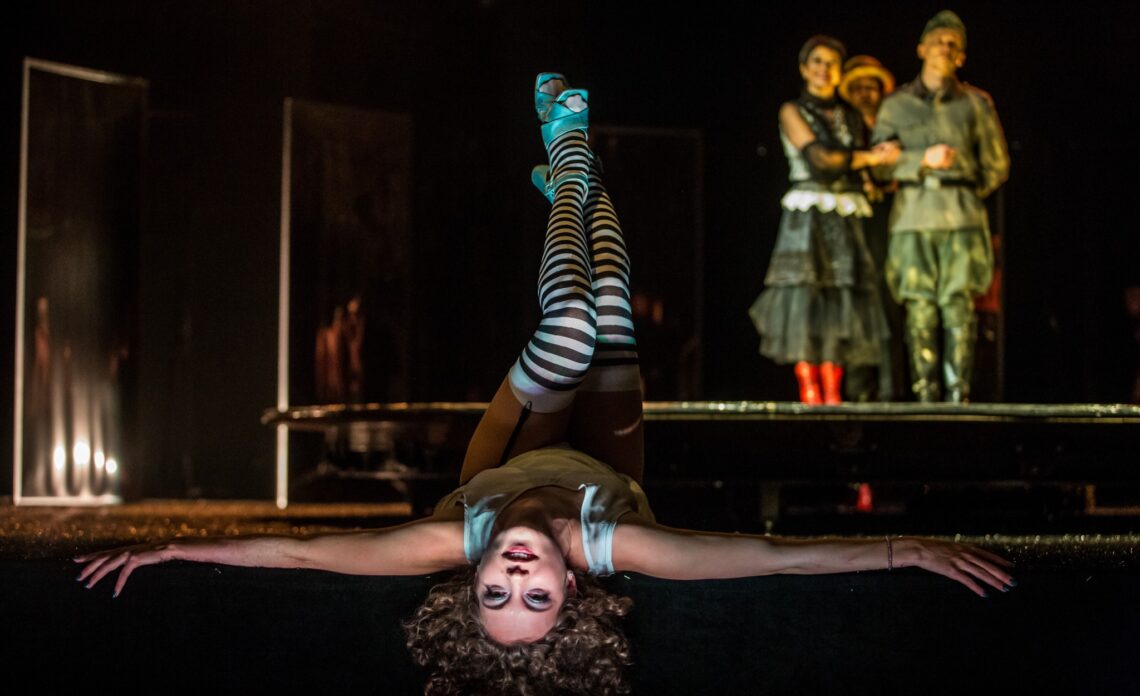Animal Farm

textSzczepan Twardoch
Achival
2h 15 minutes, no intermission
Premiere date 21/10/2018

Regular ticket prices from 40zł to 65zł
Concessionary ticket prices from 30zł to 50zł
Information for wheelchair users: due to the varying setup of the playing space, please contact the Viewer Service Office before booking/purchasing tickets to obtain information on the availability of appropriate seats. Email: bow@teatrslaski.art.pl, phone number: +48 32 258 89 67.
A story about a beautiful but also tragic fate of two families. Josef Magnor, a Silesian miner and insurgent, is separated from Nikodem Gemander, his great-grandson and successful architect, by over 100 years of history, but they still share a lot – from blood ties, through ancestral fate, to the extraordinary gift of self-destruction. The fate of the individual characters of this unusual saga is united by wars and uprisings, death and birth, as well as love, betrayals and dreams that will never come true. Above all, they are joined by the figure of an observer and narrator, Drach, who is the land, who sees the past and the future, who speaks in all languages, for whom human matters have no meaning and for whom everything is now. The spectacle in the aesthetics of a cabaret (set by Katarzyna Borkowska) is accompanied by a musician playing live music.
The spectacle at Teatr Śląski was the premiere adaptation and staging of “Drach” by Szczepan Twardoch – one of the most important contemporary writers in Poland. Twardoch has been honoured with many prestigious awards, including the Polityka’s Passport and the Kościelski Award, Brücke Berlin-Preis, Silesia Literary Laurel, Onet O!Lśnienie Cultural Award, Nike Audience Award and a record number of nominations (including to the Nike, Gdynia and Angelus awards). The rights to his novel have been sold to several countries. The premiere of “The King” in the United States is planned for 2020. Based on this novel, a Canal+ show is being created.
Production of St. Wyspiański Teatr Śląski in Katowice and Teatr Ziemi Rybnickiej under the patronage of the city of Rybnik.






Do not let the frenetic convention of this brutal cabaret of Silesian history fool you. “Drach” by Talarczyk is indeed a touching and melancholic tribute to people who remain nobody to the world and whose pain cannot be underestimated. I cannot write about it without emotions, because at the most personal level (memories, family mythology) the excellent spectacle of Teatr Śląski seems very real to me.
Wojciech Rusinek, artPAPIER
Many images and words create a memorable impression, making up a very bitter portrait of people running after the illusion of happiness. And they discover, again and again, that this happiness is just smoke and mirrors, an introduction to failure, another giggle of fate.
Henryka Wach-Malicka, Dziennik Zachodni
I will not easily forget the scene with Valeska, brilliantly played by Barbara Lubos, when (very clearly!) at one time she is a young woman, and at other times – an old woman getting ready to die. The scenes with the tragicomic Grażyna Bułka as Gela also bring enlivenment. Not to mention the great mastery of Silesian dialect of both ladies, which clearly stands out. There are no protagonists in this saga, which means that everyone is the main character.
Marta Odziomek, Gazeta Wyborcza Katowice
The form of theatrical adaptation is as if taken from Bob Fosse’s “Cabaret”. The master of the clownish and nostalgic ceremony is a hermaphrodite couple played by Anna Kadulska and Bartłomiej Błaszczyński; it is the Drach-narrator who presents the 20th-century saga of Magnors, Gemanders and Czoiks condemned to two world wars, uprisings, the Plebiscite, and Nazi and Soviet occupation. This café mood is co-created by a musician accompanying them from the loge. (…) A smooth script, dazzling stage design, atmospheric music, good acting
Krystian Węgrzynek, wachtyrz.eu
After the release of ”Drach”, Szczepan Twardoch, in the crossfire of questions, confessed that if he had had to stage it, it would have been with a method of settings. Talarczyk does not reach for Hellinger, but undoubtedly “Drach” is a game of set-ups and overheads. One can get a bump. But maybe this is what it is about.
Monika Gorzelak, artPAPIER


Article
Olga Tokarczuk, the 2018 Nobel Prize-winning Polish writer, has released her extraordinary novel ‘The Empusium’ in 2024. Robert Talarczyk adapted
Read o: 'The Empusium' with English surtitles back on our stage
Article
On summer Saturdays we will make Katowice dance again by Dancing Wyspianski! Put on your dancing shoes and get ready
Read o: Dancing Wyspianski - open air dances this summerTa strona korzysta z plików cookie, aby poprawić wrażenia podczas poruszania się po witrynie. Spośród nich pliki cookie, które są sklasyfikowane jako niezbędne, są przechowywane w przeglądarce, ponieważ są niezbędne do działania podstawowych funkcji witryny. Używamy również plików cookie stron trzecich, które pomagają nam analizować i rozumieć, w jaki sposób korzystasz z tej witryny. Te pliki cookie będą przechowywane w Twojej przeglądarce tylko za Twoją zgodą. Masz również możliwość rezygnacji z tych plików cookie. Jednak rezygnacja z niektórych z tych plików cookie może wpłynąć na wygodę przeglądania.